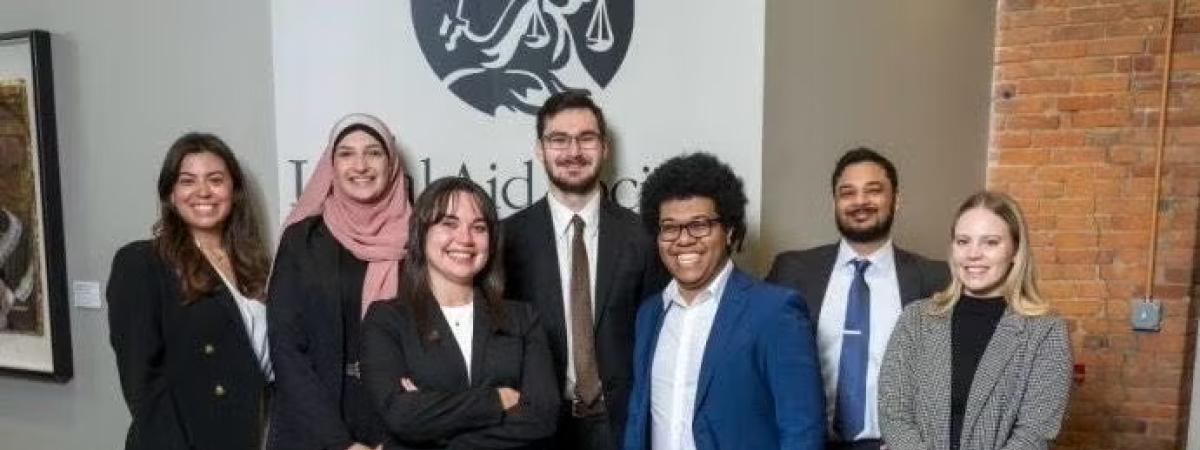
Giving back: Meet five students spending their summer at the Legal Aid Society of Cleveland
With a mission to secure justice, equity and access to opportunity for and with people who have low incomes, the Legal Aid Society of Cleveland provides legal representation to the community. Five law students are working as summer associates at the Legal Aid Society, cultivating their passion for legal advocacy as they continue their education.
Rising 3L Daniel Leizerman has been involved with Legal Aid since his first year of law school and is now in his fourth placement with the organization. This past semester, the Legal Aid Society awarded Leizerman the Volunteer Lawyers Program 2024 Access to Justice Award. He hopes to continue working for Legal Aid after graduation next spring.
Emma Kahmann entered law school with longstanding interests in health, criminal and family advocacy, intersecting issues that are commonly faced by the clients of the Legal Aid Society. During her time at Legal Aid, Kahmann aims to gain a deeper understanding of the community and the challenges faced by its most vulnerable members.
As a rising 3L, Lauren Ostrom is heavily involved on-campus with National Lawyers Guild, Yemen Accountability Project, Refugee Outreach Collective and War Crimes Prosecution Watch, organizations that help her utilize her passions while cultivating her learning.
Neil Agarwal is a rising 3L who was interested in working for the organization because of their wide-reaching impact and quality of Legal Aid staff. After graduation, Agarwal hopes to work for a local public-interest nonprofit doing community lawyering for underserved populations.
As a spring start student, Summer Husein dove in to the opportunity to advocate for and raise awareness within the law school about real-world issues through Muslim Law Students Association, Law Students for Justice in Palestine and the Refugee Outreach Collective. After graduation, she aims to work in the public interest sector with a focus on the welfare of women and children.
What drew you to working with Legal Aid?
Ostrom: I wanted to work at Legal Aid because I love their mission of helping low income individuals have access to justice and breaking down systemic barriers at the same time. I’ve worked with Legal Aid in the past during immigration work permit clinics.
Husein: Legal Aid is clear with their mission of providing access to justice and doing what they say they are going to do. It is easy to say you can help and never follow through, but at Legal Aid, they make the commitment and make sure that clients receive the help they need. Yes, no one entity can help every person, that's just the reality, but Legal Aid makes a strong effort to push the clients they can't take in the right direction. Before coming to Legal Aid as a summer associate, I volunteered at their Brief Advice Clinics. These clinics are amazing as it gives law students the opportunity to get some real world experience while also providing the opportunity to help someone that could otherwise not obtain legal assistance.
Describe a typical “day in the life” as a summer associate?
Leizerman: Because the Volunteer Lawyers Program does a little bit of everything, my days tend to be quite different. Sometimes, several expungements come in on the same day, and I draft the paperwork for multiple people to be able to file to expunge their record. Other days, we receive documents from clients who are ready to file bankruptcy, so I organize the files and follow up with them to get any of the missing documents needed to have a complete bankruptcy application. Some days, I look at how to expand the impact of Legal Aid by examining areas where services are lacking or developing new ways of reaching existing clients. Finally, and my favorite, I go to every Saturday brief advice clinic, where clients can come in to receive brief advice from a volunteer attorney on any sort of civil legal issue. Being able to help Legal Aid serve 30, 40 or even 50 clients and either solve their legal issue or provide meaningful next steps is exactly why I wanted to go to law school.
Kahmann: One of the most rewarding parts of being a summer associate at Legal Aid is that no two days are the same. Each morning, I usually begin by attending a housing court hearing to support a client facing eviction. After that, I am often invited by staff attorneys to observe mediations, sit in on client interviews, or assist with litigation preparation. I also regularly collaborate with the other summer associates to attend events such as brief advice clinics, courthouse tours, and training sessions. So far, the highlight of my summer has been watching one of our housing attorneys deliver an oral argument at the Court of Appeals.
What were you most excited to learn going into this summer?
Agarwal: I was excited to learn exactly how Legal Aid helps clients with special education needs, and how their lawyers work with schools to ensure the best outcomes for local kids. The most surprising thing so far is the extent to which the justice gap affects low-income Clevelanders, and how Legal Aid tries to close the gap.
Husein: I was most excited about this summer was discovering why most attorneys tend to shy away from family law. Every time I have had the opportunity to attend a brief advice clinic or host a pro bono collaborative all the attorneys would shy away from the family law cases. So having the opportunity to explore family law and the impact it can make is what I was most excited for this summer.
What’s the most interesting or surprising thing you’ve learned in this position?
Kahmann: Having just finished 1L property with Professor Ellis, I was excited to dive into housing law with fresh landlord-tenant knowledge. But I quickly realized that Cleveland’s housing landscape is far more complex than the general rules I had studied. The city has a number of unique, often landlord-friendly ordinances that can be confusing and overwhelming for the average tenant. Working in housing has pushed me to become not just a better-informed renter myself, but also an advocate for helping others understand and assert their rights.
Ostrom: I was most excited to learn about the advocacy projects Legal Aid is doing because it’s such an important way that we are helping populations gain legal resources that they deserve. I am continuously amazed every day to see the passion and hard work of everyone at Legal Aid as they support their clients.
Do you have any advice for students wanting to work with Legal Aid in the future?
Agarwal: Be inquisitive! Make yourself available to help with assignments and try to be flexible. Show that you're dedicated to public-interest lawyering.
Leizerman: My advice for students who want to work with Legal Aid in the future is to get involved. Go to a Saturday brief advice clinic where you can see the type of clients that Legal Aid helps, practice client skills, learn about different areas of the law and network with the volunteer attorneys staffing the clinic. From there, you can apply for externships and the summer associate program. Showing a deep commitment to helping underserved populations comes primarily through getting involved and doing extensive volunteering and externships. All of that will help you work with organizations that practice similar sorts of law to Legal Aid.



